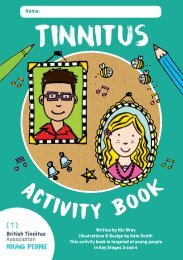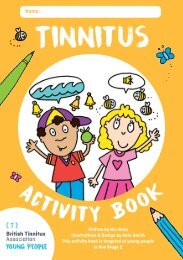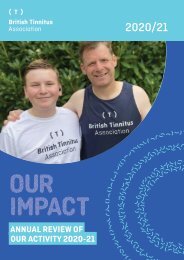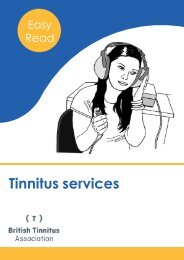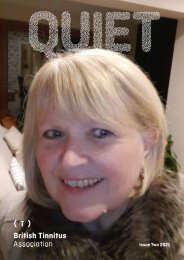Our Impact 2020/21
Annual review of our activity 2020/21.
Annual review of our activity 2020/21.
Create successful ePaper yourself
Turn your PDF publications into a flip-book with our unique Google optimized e-Paper software.
The mum-of-one saw several GPs over a threeweek<br />
period and tried antibiotics, sleeping tablets<br />
and nasal sprays, while some doctors just said<br />
to ignore it. Nothing worked though and, feeling<br />
increasingly helpless, she Googled ‘tinnitus’,<br />
which led to her reading a number of alarming<br />
articles stating that there is no cure.<br />
“By this point it started to feel that this tinnitus<br />
sound, which was completely new to me at that<br />
point, was going to be with me forever and there<br />
would be nothing that I could do about it. I began<br />
to feel extremely distressed, and I couldn’t eat for<br />
worrying – which led to me losing weight – and<br />
I couldn’t sleep either. In fact, I was scared to<br />
lay in bed and scared to get up – I just couldn’t<br />
escape the sound. It all started to spiral. I just felt<br />
like a different person and couldn’t see a way out.<br />
I didn’t want to live anymore, and I was afraid of<br />
how I was thinking.”<br />
After the panic attack Christina knew that she<br />
had to look at her tinnitus differently and asked<br />
for an appointment with a doctor to discuss her<br />
mental health. The way the GP approached her<br />
condition changed everything for her:<br />
“This doctor stopped, listened and then<br />
educated me – all in the space of a 20-minute<br />
appointment. For me, talking through the mental<br />
health challenges I’d been experiencing and<br />
having them validated by a health professional<br />
took a weight off my shoulders. She explained<br />
what tinnitus is and we talked about different<br />
management strategies. For the first time I could<br />
see light at the end of the tunnel.<br />
“I had a really helpful call with someone on the<br />
British Tinnitus Association helpline and joined a<br />
local tinnitus support group, where I learned why<br />
the brain reacts the way it does and how other<br />
people cope with their tinnitus. It was like putting<br />
a jigsaw together and, once I understood it, life<br />
just got a lot better.<br />
“I have since discovered that I suffer from<br />
high-frequency hearing loss and so I now have<br />
a hearing aid, which helps. I also found that<br />
meditation – something I never would have<br />
considered before – improves things as stress<br />
and anxiety are major triggers for tinnitus.<br />
“Tinnitus is a really misunderstood condition<br />
and it’s not taken as seriously as it should be.<br />
The fact that it’s invisible makes it hard for<br />
people to understand and that can make dealing<br />
with it quite a lonely experience. I definitely think<br />
my healthcare journey could have been a lot<br />
better but it really improved once I addressed the<br />
mental health concerns of tinnitus.<br />
“I would advise anyone who is struggling<br />
with tinnitus right now to access support as<br />
early as possible and to ensure they share the<br />
mental health challenges right from the first<br />
appointment. Once I did that, things started<br />
to improve, and I haven’t seen another<br />
doctor since.”<br />
07




